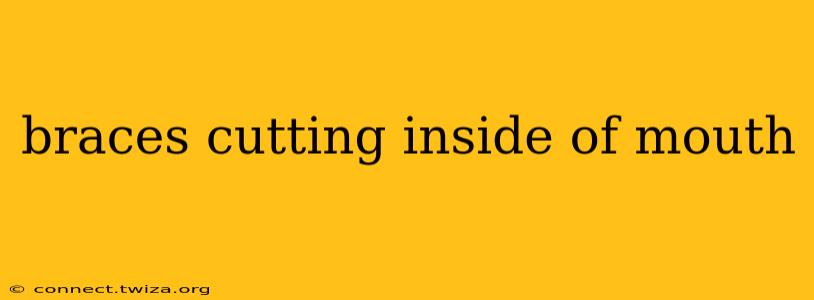Dealing with braces is a commitment, and while they work wonders for straightening teeth, the journey isn't always smooth sailing. One common complaint among braces wearers is the irritating feeling of the braces cutting or scraping the inside of their mouth. This discomfort can range from a mild annoyance to a significant source of pain, impacting eating, speaking, and overall quality of life. This article will delve into the causes, prevention strategies, and relief options for this frustrating problem.
Why Do Braces Cut the Inside of My Mouth?
This is a question many braces wearers ask. The most common culprit is new braces or recently tightened wires. When your orthodontist adjusts your braces, the wires and brackets shift, potentially causing them to rub against the soft tissues of your cheeks, tongue, or lips. The sharp edges of brackets or protruding wires are the main offenders.
Over time, the tissues in your mouth can adapt, but initially, this friction leads to irritation, sores, and the feeling of being cut.
What Can I Do to Prevent Braces from Cutting My Mouth?
Prevention is key to minimizing discomfort. Here are some proactive steps you can take:
-
Regular Orthodontist Visits: Sticking to your scheduled appointments ensures your orthodontist can address any issues promptly, adjusting wires and brackets to prevent excessive rubbing.
-
Use Orthodontic Wax: This is your best friend! Orthodontic wax is a soft, pliable wax specifically designed to coat sharp edges of brackets and wires. Apply a small amount over the offending area to create a buffer between the metal and your mouth tissue.
-
Rinse Regularly: Good oral hygiene is crucial. Rinsing your mouth with a fluoride mouthwash after meals and before bed helps prevent infection and keeps your mouth clean. A saltwater rinse can also help soothe irritated areas.
-
Gentle Brushing: Use a soft-bristled toothbrush and gentle brushing techniques to avoid further irritation of the affected areas.
How Long Does it Take for Braces to Stop Cutting My Mouth?
The duration varies greatly depending on the individual, the severity of the irritation, and the adjustments made by your orthodontist. In most cases, the initial irritation subsides within a few days to a week as your mouth adjusts to the new position of the brackets and wires. However, if the problem persists or worsens, contact your orthodontist immediately.
What Can I Do for Immediate Relief from Braces Cutting My Mouth?
Beyond using orthodontic wax, several methods provide quick relief:
-
Saltwater Rinse: Dissolve half a teaspoon of salt in a glass of warm water and gently rinse your mouth several times a day. This can soothe irritation and reduce inflammation.
-
Over-the-Counter Pain Relievers: Ibuprofen or acetaminophen can help manage any pain associated with the irritation. Always follow the dosage instructions on the packaging.
-
Avoid Irritating Foods: Steer clear of hard, crunchy, or sticky foods that can further irritate the sores. Opt for soft, easily chewed foods until the irritation heals.
-
Oral Anesthetic Gels: Products like Orajel can provide temporary numbing relief.
Are There Any Long-Term Effects of Braces Cutting the Inside of My Mouth?
Generally, the irritation caused by braces is temporary and doesn't lead to lasting damage. However, neglecting persistent sores can increase the risk of infection. If you notice any signs of infection, like persistent pain, swelling, or pus, seek immediate dental attention.
When Should I Call My Orthodontist?
While some discomfort is expected, persistent pain, bleeding, or signs of infection warrant a call to your orthodontist immediately. Don't hesitate to contact them if you're concerned. They can examine your braces and make necessary adjustments to alleviate the discomfort.
This information is for general knowledge and should not replace professional advice. Always consult with your orthodontist for personalized guidance and treatment regarding your braces. They are the best resource for managing any issues you encounter during your orthodontic treatment.
